 Reading 1, Joshua 24:1-2, 15-17, 181 Joshua gathered all the tribes of Israel together at Shechem; he then summoned all the elders of Israel, its leaders, judges and officials, and they presented themselves in God's presence. 2 Joshua then said to all the people: 'Yahweh, the God of Israel, says this, "From time immemorial, your ancestors, Terah, father of Abraham and Nahor, lived beyond the River, and served other gods. 15 But if serving Yahweh seems a bad thing to you, today you must make up your minds whom you do mean to serve, whether the gods whom your ancestors served beyond the River, or the gods of the Amorites in whose country you are now living. As regards my family and me, we shall serve Yahweh.' 16 The people replied, 'Far be it from us to desert Yahweh and to serve other gods! 17 Yahweh our God was the one who brought us and our ancestors here from Egypt, from the place of slave-labour, who worked those great wonders before our eyes and who kept us safe all along the way we travelled and among all the peoples through whom we passed. 18 And Yahweh has driven all the nations out for us, including the Amorites who used to live in the country. We too shall serve Yahweh, for he is our God.' Reading 2, Ephesians 5:21-3221 Be subject to one another out of reverence for Christ. 22 Wives should be subject to their husbands as to the Lord, 23 since, as Christ is head of the Church and saves the whole body, so is a husband the head of his wife; 24 and as the Church is subject to Christ, so should wives be to their husbands, in everything. 25 Husbands should love their wives, just as Christ loved the Church and sacrificed himself for her 26 to make her holy by washing her in cleansing water with a form of words, 27 so that when he took the Church to himself she would be glorious, with no speck or wrinkle or anything like that, but holy and faultless. 28 In the same way, husbands must love their wives as they love their own bodies; for a man to love his wife is for him to love himself. 29 A man never hates his own body, but he feeds it and looks after it; and that is the way Christ treats the Church, 30 because we are parts of his Body. 31 This is why a man leaves his father and mother and becomes attached to his wife, and the two become one flesh. 32 This mystery has great significance, but I am applying it to Christ and the Church. Gospel, John 6:60-6960 After hearing it, many of his followers said, 'This is intolerable language. How could anyone accept it?' 61 Jesus was aware that his followers were complaining about it and said, 'Does this disturb you? 62 What if you should see the Son of man ascend to where he was before? 63 'It is the spirit that gives life, the flesh has nothing to offer. The words I have spoken to you are spiritand they are life. 64 'But there are some of you who do not believe.' For Jesus knew from the outset who did not believe and who was to betray him. 65 He went on, 'This is why I told you that no one could come to me except by the gift of the Father.' 66 After this, many of his disciples went away and accompanied him no more. 67 Then Jesus said to the Twelve, 'What about you, do you want to go away too?' 68 Simon Peter answered, 'Lord, to whom shall we go? You have the message of eternal life, 69 and we believe; we have come to know that you are the Holy One of God.' REFLECTION:The gospel of today, conscious that it is now the concluding part of the Bread of Life discourse, caps with the two prominent attitudes towards Jesus’ Words: disappointing unbelief and the steadfastness of faith. These two reactions set us into our meditation today as it allows us to situate our faith in the context of Jesus’ challenge of abandoning ourselves to him. Mindful of the context provided by the previous three Sundays, the Bread of Life discourse unfolds a challenging message. But the focal point of the Bread of Life discourse is Jesus’ invitation to entrust our faith to him; for whoever believes in Him receives eternal life. And since Jesus picked up the image of eating from the sign he had done before this discourse, Jesus challenges those who have eaten that bodily bread, to entrust their faith into a new and greater level. They must not only believe in him just because he has able to provide bread from out of scarce. Rather, they must believe in him because He is the Bread of Life himself. Yet, the long and arduous discussion over this matter yielded a greater unbelief from among his circle. Jesus’ disciples cannot accept a hard saying which Jesus dares them to stand for. They cannot understand Jesus’ revelation and indeed the promise of that revelation which is eternal life is not clear to them. Consequently, they have to desert the Lord because he sounds untenable, weird and eccentric. Who is going to eat the flesh and drink the blood of someone and from which action (which is first and foremost unacceptable) one gains eternal life? The disciples found it puzzling and it does not practically make sense! For them, perhaps, that is the most unbelievable; it is out of one’s right mind to realize that.
But hope sprouts from that sad story of abandonment. The apostles themselves, now facing the challenge, take a stand to believe. Peter, their spokesperson, answers Jesus’ challenge not heroically but it is an answer of full entrustment; it is an answer total self-abandonment. Unlike the previous disciples who saved their skin from the mystery and abandon Jesus on account of this; Peter and his comrades abandon themselves to the mystery of Jesus. He said: “Lord, to whom shall we go? You have the words of eternal life; and we have believed, and have come to know, that you are the Holy One of God” (Joh 6:68-69 RSV). The apostles’ confidence is well-founded on their hope that Jesus will make sense; if not that discernible for now; perhaps at some future time. But, they believe that by the fact that they throw themselves to the mystery of God, to his words of eternal life, they begin a journey of faith that will surely open to them paths that will make this faith meaningful in their lives. Faith in God does not start with some clear picture of the future promise; it starts something as a dimly vision in a mirror (cf. 1 Cor. 13:12) as Paul tries to express it, but surely later it will reveal itself when “face to face” one can behold the object of this faith. Peter and the apostles risk for a faith through faith and they did this not because they have the capacity to do it. It is God’s grace that moves them. Like also Mary, the Mother of Jesus, who at first cannot picture the message of the angel to her to become the Mother of the Savior, throws herself to the action of God’s grace so that she will accept God’s will to her even without a complete or sufficient knowledge of what she is entering into.
God’s grace of faith is what makes life more meaningful and grounded; a life even stormed by the physical strength of problems, can always trust and anchor its hope in God. This is what is lacking with those who abandoned Jesus, they had not been docile to the action of God’s grace but rather, as we have meditated Sundays before, they listen contently to the murmur of their own making and thus listening to their own voices which can never do great apart from God’s grace. Like Joshua in our first reading, let us continually be confident in proclaiming our steadfastness to God even though heaps of challenges and problems bump us along the journey of faith. Without faith, we cannot profess our service to Jesus, because without faith, he is meaningless in us. Our confidence in him too finds meaning, our life story – the whole of it with all the good and bad chapters, our sufferings, our joys are only meaningful because it is tied in faith in Christ Jesus.
Concluding this meditation, I take the word from our Holy Father, Benedict XVI who said: “We see that to be God’s child is not a matter of dependency, but rather of standing in the relation of love that sustains man’s existence and gives it meaning and grandeur” (Pope Benedict XVI, Jesus of Nazareth Part I, p. 139). Indeed, faith allows us to recognize our relationship with God not because we are dependent, not because we see him providing bread for our physical hunger. We recognize this relationship as love; a relationship truly imbued by God’s own initiative of calling us through faith. From that initiative of God calling us, we configure ourselves to him, shaping our life’s meaning according to his will.Contributor:Fray Ric Anthony Reyes, OSA
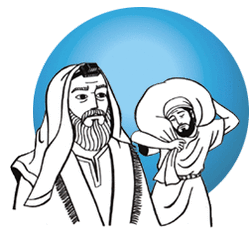 Ez 43: 1-7abPs 85 Mt 23: 1-12 They do not practice 1 Then addressing the crowds and his disciples Jesus said, 2 'The scribes and the Pharisees occupy the chair of Moses. 3 You must therefore do and observe what they tell you; but do not be guided by what they do, since they do not practise what they preach. 4 They tie up heavy burdens and lay them on people's shoulders, but will they lift a finger to move them? Not they! 5 Everything they do is done to attract attention, like wearing broader headbands and longer tassels, 6 like wanting to take the place of honour at banquets and the front seats in the synagogues, 7 being greeted respectfully in the market squares and having people call them Rabbi. 8 'You, however, must not allow yourselves to be called Rabbi, since you have only one Master, and you are all brothers. 9 You must call no one on earth your father, since you have only one Father, and he is in heaven. 10 Nor must you allow yourselves to be called teachers, for you have only one Teacher, the Christ. 11 The greatest among you must be your servant. 12 Anyone who raises himself up will be humbled, and anyone who humbles himself will be raised up. REFLECTION:In today's Gospel we hear Jesus denouncing the scribes and the Pharisees. Jesus instructed his disciples and the crowd to follow what they preach but not what they do.
We should admit that not all the scribes and Pharisees during those times are signs of contradictions unto themselves. However, the Gospel writer used them to teach us a very important lesson that our Blessed Lord wants us to learn. We should not be people of dichotomization.
What we say should reflect our actions. If we say this is bad and should not be done, then we, ourselves, are bound not to do it. The preacher himself should be the first one to practice what he is preaching. This is the right thing to do.
But we are humans, weak and easily tempted. Due to this reality we falter and sometimes contradict what we preach to others. God surely understands us because Christ himself experienced how it is to be tempted. We are weak, yes, but we are also capable of transcending to be able to resist temptation. All we need to do is trust in God and pray to pass each test.
Let us not be like the Pharisees and scribes described in the Gospel today. Let us try harder to resist temptations and pray harder. Let us not be like the Pharisees who have been dichotomized because of their contradicting words and actions. Contributor:Fray Aimark Asor, OSA
 Ez 36: 1-11Ps 23 Mt 20: 1-16 20 “For the kingdom of heaven is like a landowner who went out early in the morning to hire workers for his vineyard. 2 He agreed to pay them a denarius[ a] for the day and sent them into his vineyard. 3 “About nine in the morning he went out and saw others standing in the marketplace doing nothing.4 He told them, ‘You also go and work in my vineyard, and I will pay you whatever is right.’ 5 So they went. “He went out again about noon and about three in the afternoon and did the same thing. 6 About five in the afternoon he went out and found still others standing around. He asked them, ‘Why have you been standing here all day long doing nothing?’ 7 “‘Because no one has hired us,’ they answered. “He said to them, ‘You also go and work in my vineyard.’ 8 “When evening came, the owner of the vineyard said to his foreman, ‘Call the workers and pay them their wages, beginning with the last ones hired and going on to the first.’ 9 “The workers who were hired about five in the afternoon came and each received a denarius. 10 So when those came who were hired first, they expected to receive more. But each one of them also received a denarius. 11 When they received it, they began to grumble against the landowner.12 ‘These who were hired last worked only one hour,’ they said, ‘and you have made them equal to us who have borne the burden of the work and the heat of the day.’ 13 “But he answered one of them, ‘I am not being unfair to you, friend. Didn’t you agree to work for a denarius? 14 Take your pay and go. I want to give the one who was hired last the same as I gave you. 15 Don’t I have the right to do what I want with my own money? Or are you envious because I am generous?’ 16 “So the last will be first, and the first will be last.” Reflection:
Today's Gospel shows the generosity of God to his people. The story about the workers in the vineyard indirectly say this. God gives us according to what we need. The master who hired laborers in the story is not unjust but rather, he gives out or compensate according to his desire. In the same way, God gratuitous grace is give to all according to what our need. And God could never be labeled unjust. Justice belongs to him, how can he be called unjust?
The whole Roman Catholic Church is also commemorating the Queenship of our Blessed Mother, Mary. God was so generous so as to share his only begotten Son for the remission of our sins. And for this to happen, he needed to enter into human historicity in a natural manner. This necessitated the Father to choose a woman to give her humanity to the Divine. This is the greatest mystery of humanity; a God assuming human flesh to die for humankind. Thus, Mary played a very important role in the story of Christ's incarnation.
With Mary's "fiat" God was able to walk in our midst physically. And with the sending of the Archangel Gabriel to the young girl kneeling in prayer, God's generosity overflowed from all eternity. That is why it is but then proper for us to give the Mother of God, Θεοτοκος, the highest honor, hyperdulia, but not worship.
God's generosity knows no bound. All we need to do is to go to him and be sorry for the wrong things we have done. And let us ask the intercession of our Blessed Mother to help us in approaching her Son.
In God's loving mercy, we trust...
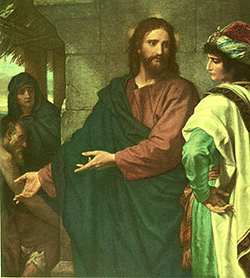
Ez 28:1-10
Dt 32
Mt 19:23-30 Eye of a needle
Gospel Reading:
23 Then Jesus said to his disciples, “Truly I tell you, it is hard for someone who is rich to enter the kingdom of heaven .24 Again I tell you, it is easier for a camel to go through the eye of a needle than for someone who is rich to enter the kingdom of God.” 25 When the disciples heard this, they were greatly astonished and asked, “Who then can be saved?” 26 Jesus looked at them and said, “With man this is impossible, but with God all things are possible.” 27 Peter answered him, “We have left everything to follow you !What then will there be for us?” 28 Jesus said to them, “Truly I tell you, at the renewal of all things, when the Son of Man sits on his glorious throne, you who have followed me will also sit on twelve thrones, judging the twelve tribes of Israel. 29 And everyone who has left houses or brothers or sisters or father or mother or wife [a] or children or fields for my sake will receive a hundred times as much and will inherit eternal life. 30 But many who are first will be last, and many who are last will be first. Reflection:"For human beings this is impossible, but for God all things are possible."
The Gospel reading today is the continuation of yesterday's story about the rich young man who asked Christ what must he do to gain eternal life.
Today the reading speaks about an analogy popular to us. It is about a camel passing through the eye of a needle. Scholars explains this by getting into the jargon and context of the story. Nevertheless, for a commoner one thing is certain. It is unimaginable for a camel to enter a needle's eye. Because of this, most people think that entering the Kingdom of God is totally difficult.
Though this might be the case, Jesus declared that for humans this could be impossible but never for God. Once again Jesus asserted that we need God. In everything we do God's role is indispensable. Without him, whatever we do will be in vain. Therefore, we need to depend on God. With his loving mercy and compassionate heart it is possible for humans to enter his glorious Kingdom but it takes great humility to be able to.
The latter part of the Gospel talks about the apocalyptic return of the Son of God wherein he would be judging the twelve tribes of Israel. Yesterday's Gospel was linked here because it was said that during the judgement day those who have given up everything for God's sake will receive a hundred times more, even eternal life would be given them.
This is the lot of those who, by their own will, have decided to follow Christ and be prophetic signs into the world. If they have suffered and sacrificed a lot on earth for the sake of the Christ, eternity would certainly be theirs.
In life, to follow Christ radically is not at all easy. We give so many reasons just to excuse ourselves from doing what is right. We want things to be always easy and comfortable for us. What we tend to forget is the fact that God's way is not the easy way. His way is through the Cross. Let us think about this and try harder to live a life worthy of Christ.
In God's loving mercy, we trust...
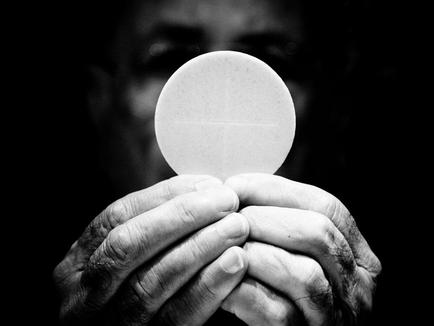 Reading 1, Proverbs 9:1-6 Responsorial Psalm, Psalms 34:2-3, 10-11, 12-13, 14-15 Reading 2, Ephesians 5:15-20 Gospel, John 6:51-58 51 I am the living bread which has come down from heaven. Anyone who eats this bread will live for ever; and the bread that I shall give is my flesh, for the life of the world.' 52 Then the Jews started arguing among themselves, 'How can this man give us his flesh to eat?' 53 Jesus replied to them: In all truth I tell you, if you do not eat the flesh of the Son of man and drink his blood, you have no life in you. 54 Anyone who does eat my flesh and drink my blood has eternal life, and I shall raise that person up on the last day. 55 For my flesh is real food and my blood is real drink. 56 Whoever eats my flesh and drinks my blood lives in me and I live in that person. 57 As the living Father sent me and I draw life from the Father, so whoever eats me will also draw lifefrom me. 58 This is the bread which has come down from heaven; it is not like the bread our ancestors ate: they are dead, but anyone who eats this bread will live for ever. REFLECTION:
Reflection for August 19, 2012 - Jn. 6:51-58 20th Sunday in Ordinary Time: Communion to Eternal Life: God’s Promise and the Goal of the Church
Since the inauguration of Vatican II Council, the Church focuses herself to the ecclesiological vision of communion. She understands herself as a Communion. As a communion, the Church wants to renew her life by going back to the very foundation of her existence – and thus, she goes back again and again to Jesus Christ, her husband. In this way, the Church as our Mother teaches us to do the same. She teaches us to the way of communion according to the primordial zeal and enthusiasm of the first Jerusalem community (Acts 4:32-37). By constantly renewing herself to communion with her husband, the Church becomes constantly committed to her vocation of calling every believer back to Christ. This vocation, this called to live out a life of communion is rooted on the inspiration of the Eucharist; Jesus’ gift of his body and blood, his sacramental presence.
Our initial meditation of the mystery of communion of the Church to Christ becomes an inseparable fruit of the message of today’s Gospel reading. While still on the same Discourse on the Bread of Life, we encounter the insistent and bold promise of Jesus in the gospel. Jesus as the Bread of Life that comes from the Father and gives eternal life is the initial unfolding of the discourse. But in this part of the gospel, we encounter Jesus’ promise to those who receive him in faith: “He who eats my flesh and drinks my blood abides in me, and I in him” (Joh 6:56 RSV). Jesus now reveals himself to be present on those who receive him. There is communion between Jesus and the believer. Contained this promise, viewed against the full background of the discourse, is Jesus’ assurance of eternal life to those who eat his flesh and drink his blood. Thus, being in communion with Jesus is actually in communion with life eternal in Jesus. To receive him means to participate in the communion of eternal life of God and even I dare say, it is our participation to the Trinitarian life.
The Church’s vocation to live out a life of communion, inspired by the Eucharist is rooted ultimately on the promise of the ultimate communion in the life of God. The Church herself is not the end or the goal of communion; it is the means to that ultimate communion promised in today’s gospel. The communion of the Church is a means of remedying the wound that has been caused by sin. We know that God’s plan “was to raise men to a participation of the divine life” (Lumen Gentium, 2); but we equally know that sin broke the integrity of creation, and particularly, that of man. That is why, God had offered his Son be broken also in the sacrifice of the cross, indeed, like a bread being broken to be shared by humanity in order that those who consume in faith the saving “brokenness” of the Son of the Cross will be drawn in unity to Him. Indeed, they will look on him whom they pierced (cf. Zec. 12:10; Jn 19:37); and from which pierced side, blood and water, symbols of the Eucharist and Baptism, flow as a saving bath and drink for those who heed and gathered in faith under His cross. There, the Church is born.
This gaze to the saving death, to the brokenness of the Son on the cross serves the inspiration of the Church continually draw men and women to Christ. She herself will be a sacrament to all for Christ, calling to everybody in repentance and join the community of believers. So, the Church has not been static under the cross. Christ’s resurrection and ascension mandated her to go and proclaim his teachings which ratified by his resurrection from the dead. By doing so, the Church, from the time of resurrection until the parousia, walks and lives out her vocation to communion, calling and drawing men and women of all walks of life. She is a pilgrim Church – a Church that journeys into the fulfillment of Christ’s promise while trying to embodying it along the way.
In the journey, she encounters all kinds of difficulties and temptations of evil ways. But, inspired by Jesus, she struggles to oppose the current. Thus, she is also tired, tensed, stressed and exhausted. At times, her very exhaustion tempts her to quit. But, the very same Jesus, the sacrament of the Eucharist, the gift of the pierced one keeps her strengthened spiritually. This is why, as Christians, we are always invited to eat the flesh of the Lord in the bread of the Eucharist. There, we are being strengthened, refreshed and fortified against the malicious ways of the present age. The Eucharist is our viaticum in this earthly journey; a food that assures our continual communion with Christ despite walking the dark valley. This is the prefiguration of the first reading today. The Eucharist is like the banquet of the personified Wisdom. She always invites us to throw out the life of ignorance and to embrace the life of understanding. (Prov. 9:4-6). In Jesus, the Wisdom of God made flesh, he calls us into the altar of the Eucharist and to share the life of God himself.
Paul’s reminder to the community of Ephesus serves also as a universal reminder also to all of us journeying into our goal. The second reading encourages us to be faithful in the vocation we are called by God into. As a communion of believers journeying to the goal of communion of God’s life, Paul says that it is commendable to avoid the lure of drunkenness in debauchery. He rather calls us to be filled – indeed to be drunk – with God’s Spirit. Through the Eucharist, we are able to eat and drink and assimilate Christ and thus to be Christ-like himself. In doing so, through the Eucharist, the community is “Christified”; transformed into Christ himself. I find it amusing that the second reading has the impression that we should be drunk and intoxicated by Christ so that, along the way, we can avoid the evils of present age. And while walking, we address everyone in singing of psalms and spiritual songs. If one is observant, an intoxicated person sings along the way; Paul tells us too! Let us sing along the way! Augustine has its version. He says, let us sing Alleluia while walking with all our worries. Canta y camina! Sing and walk to eternal life! Sing and walk while enjoying the food for Eternal life! Sing while the promise is nigh! Sing the communion of Christ! Canta y camina!
Contributor: Fray Ric Anthony Reyes, OSA
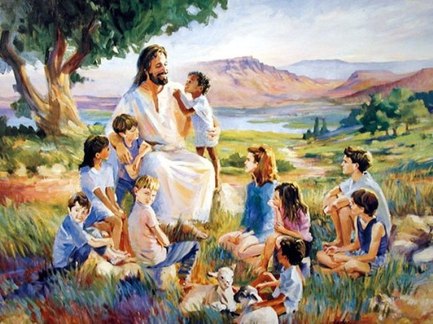 Reading 1, Ezekiel 18:1-10, 13, 30-32" Responsorial Psalm, Psalms 51:12-13, 14-15, 18-19 Gospel, Matthew 19:13-15 13 Then people brought little children to him, for him to lay his hands on them and pray. The disciples scolded them, 14 but Jesus said, 'Let the little children alone, and do not stop them from coming to me; for it is to such as these that the kingdom of Heaven belongs.' 15 Then he laid his hands on them and went on his way. REFLECTION:Let the little children come to me." We have already heard different reflections on today's Gospel. Every so often preachers exalt the characteristics children have that made Jesus say that we must be like little children to be able to enter the Kingdom. Perchance, it is their innocence that touches God so much. However, such is what many adults have lost in time.
Several years back, during election period, a television network made an advertisement urging Filipinos to vote for the right persons in government offices. The message went across the public space magnificently when they put a little girl's face on the posters saying "Boto mo, kinabukasan ko..." This advertisement must have moved every person who saw it in billboards and posters everywhere around the country. The picture captured best the little girl's innocence while asking the people to think of every Filipino child as they vote.
There is no doubt that in God's eyes we will always be his little children. But the question is, "Do we still have the hearts of children?" This is another story. Yes, we are all children in the sight of the One who made us. But do we still have that something that makes us like a child is the question now.
Brothers and sisters, let us reflect on today's Gospel and continuously pray that we may still possess the heart of a child. Because it is in the simplicity of such a heart that God is aroused and pleased. May our Mother Mary interceded for us as we remember and relive our dependence on God's loving mercy and grace.
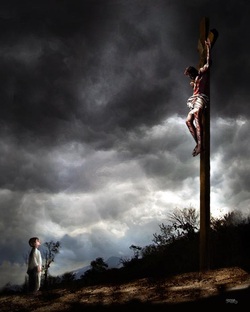 Reading 1, Ezekiel 16:59-63 Responsorial Psalm, Isaiah 12:2-3, 4, 5-6 Gospel, Matthew 19:3-12 3 Some Pharisees approached him, and to put him to the test they said, 'Is it against the Law for a man to divorce his wife on any pretext whatever?' 4 He answered, 'Have you not read that the Creator from the beginning made them male and female 5 and that he said: This is why a man leaves his father and mother and becomes attached to his wife, and the two become one flesh? 6 They are no longer two, therefore, but one flesh. So then, what God has united, human beings must not divide.' 7 They said to him, 'Then why did Moses command that a writ of dismissal should be given in cases of divorce?' 8 He said to them, 'It was because you were so hard-hearted, that Moses allowed you to divorce your wives, but it was not like this from the beginning. 9 Now I say this to you: anyone who divorces his wife -- I am not speaking of an illicit marriage -- and marries another, is guilty of adultery.' 10 The disciples said to him, 'If that is how things are between husband and wife, it is advisable not to marry.' 11 But he replied, 'It is not everyone who can accept what I have said, but only those to whom it is granted. 12 There are eunuchs born so from their mother's womb, there are eunuchs made so by human agency and there are eunuchs who have made themselves so for the sake of the kingdom of Heaven. Let anyone accept this who can.' REFLECTION:
Jesus came not to destroy the law but to fulfill it (Mt 5:17). This is a statement that bewildered the Jewish teaching authorities of Jesus' time. They had a hard time reconciling the seemingly new teachings Jesus was putting forward in contrast to their 613 laws. There was no way for them to comprehend him if they would only stick to the laws they have multiplied out of the ones given to Moses. And the Gospel reading today manifests the apprehension the law authorities have towards Jesus regarding the laws.
Jesus boldly upholds the sanctity of marriage. Marriage can be drawn up from the Old Testament up to the New Testament. This, in time, evolved into an ecclesial Sacrament due to its divine institution as seen in Scriptures.
When tested by the Pharisees about marital questions, Jesus stood still and unshaken based on His Father's command. Jesus, as the Son of God, cannot be mistaken in interpreting the law. He is the Son of God. He was there when the law was given to Moses. He was even there when the first couple was created. Why and How? Simply because He is the Word through which everything was made (cf. Jn 1:1). He is simply the Christ, the Anointed One.
The Sacrament of Marriage is so important because here a couple is given the chance to encounter God in the most unique way where the family is built. However, presumed to have love in the first place, love between two individuals ought to be the reason for their coming together and deciding to enter into a lifetime partnership before God and man. As they swear to each other and promise to love each other for the rest of their lives with full consent, marriage as a Sacrament is validly contracted. And its consummation brings it to perfection. This is the beauty of this Sacrament. Above all, we must not forget the indissolubility of the couple's partnership. This elevates marriage into a Sacrament as God is involved in this covenant.
Marriage is a Sacrament received not by all. Among the many other reasons for staying single, I suppose the greatest is to remain single and chaste for the sake of the Kingdom. I do admire those who are single and chaste, yet faithfully dedicating their lives in the service of God. This noble intention perchance has been motivated by their love for God. And for the clerics and vowed religious, to be chaste and single for the sake of the Kingdom are challenges we have received from Him. Nevertheless, to be able to respond to God is a gift given to us by Him who has challenged us. Grace abounds the most amidst life's most difficult times.
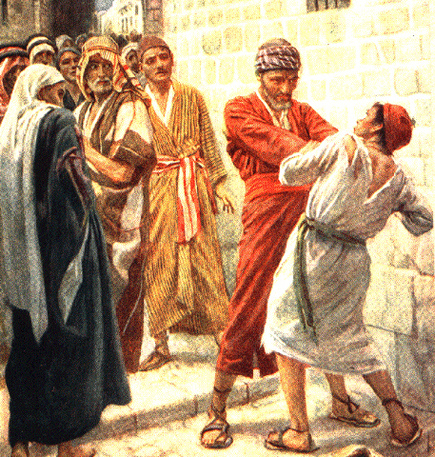 "The Unforgiving Servant"Gospel, Matthew 18:21--19:121 Then Peter went up to him and said, 'Lord, how often must I forgive my brother if he wrongs me? As often as seven times?' 22 Jesus answered, 'Not seven, I tell you, but seventy-seven times. 23 'And so the kingdom of Heaven may be compared to a king who decided to settle his accounts with his servants. 24 When the reckoning began, they brought him a man who owed ten thousand talents; 25 he had no means of paying, so his master gave orders that he should be sold, together with his wife and children and all his possessions, to meet the debt. 26 At this, the servant threw himself down at his master's feet, with the words, "Be patient with me and I will pay the whole sum." 27 And the servant's master felt so sorry for him that he let him go and cancelled the debt. 28 Now as this servant went out, he happened to meet a fellow-servant who owed him one hundred denarii; and he seized him by the throat and began to throttle him, saying, "Pay what you owe me." 29 His fellow-servant fell at his feet and appealed to him, saying, "Be patient with me and I will pay you." 30 But the other would not agree; on the contrary, he had him thrown into prison till he should pay the debt. 31 His fellow-servants were deeply distressed when they saw what had happened, and they went to their master and reported the whole affair to him. 32 Then the master sent for the man and said to him, "You wicked servant, I cancelled all that debt of yours when you appealed to me. 33 Were you not bound, then, to have pity on your fellow-servant just as I had pity on you?" 34 And in his anger the master handed him over to the torturers till he should pay all his debt. 35 And that is how my heavenly Father will deal with you unless you each forgive your brother from your heart.' 1 Jesus had now finished what he wanted to say, and he left Galilee and came into the territory of Judaea on the far side of the Jordan. Reflection:" Pagpapatawad", this is what Christ is teaching us through the parable of the unforgiving servant. Matthew beautifully puts into writing the message on "forgiveness" when Jesus speaks about forgiving "seventy times seven times". (This was also mentioned in Luke 17:4)
Ang Ebanghelyo natin sa araw na ito ay tunay na titimo sa kaibuturan ng ating puso. Isa na yata ako sa maraming tinatamaan sa mensaheng hatid ni Kristo tungkol sa pagpapatawad. Ipinapakita sa atin ng Panginoon ang kahalagaan ng pagpapatawad at ang maidudulot nito sa ating pagkatao.
Walang hanggang pagpapatawad ang ibig sabihin ni Kristo nang wikain niyang, "Hindi ko sinasabing makapito, kundi pitumpung ulit pa nito." Ito na yata ang isa sa pinakamahirap isabuhay bilang Kristiano. Kadalasan nagdarasal tayo ng walang puknat upang humingi ng tawad sa Diyos para sa ating mga pagkakasala ngunit tayo mismo ay hindi marunong magpatawad. Ito ay nakalulungkot na realidad sa karamihan ng mga Kristiano.
Kahapon lamang ay may nabasa ako sa internet na tungkol sa isang babaing mahigit na 50 taong mabilanggo sa Amerika sa salang pagpapatay sa batang inaalagaan nito. Matapos ang mahabang panahon nang pagkakakulong ay binigyan siya ng "parol". Sabi ng matanda ay nagsimulang magbago ang kanyang buhay nang makatanggap siya ng liham mula sa ina ng batang napaslang. Sa sulat na ito ay inilahad ng ina ng bata ang kanyang naramdaman matapos ang mahigit 19 na taon buhat ng mamatay ang kanyang anak. Sa dulo ng sulat ay nakasaad na pinatatawad na ng inang si Erma si Bitty. Ayon kay Bitty, ito ang nakapagpabago nang kanyang buhay. Dahil sa pagpapatawad ng ina sa kanya ay nakawala siya sa kinasasadlakang kawalan sa buhay.
Tunay na may kapangyarihan ang pagpapatawad. Dahil rito ay isinugo ng Ama ang kanyang Anak upang tayo ay maligtas sa kasalanan. Tulad ng pagpapatawad ng ina ng batang napaslang kay Bitty, ang pagpapatawad ng Ama ay nakapagpabago ng ating buhay.
Mga kapatid, hindi man madali ang magpatawad ay walang pagod nating subukang maibahagi ito sa mga nagkasala sa atin katulad ng pagpapatawad na tinatanggap natin mula sa Diyos sa tuwing dudulog o lalapit tayo sa Sakramento ng Pakikipagkasundo. Alalahanin nating nararapat na tayo ay magpatawad sapagkat tayo ay pinatawad at patuloy na pinatatawad kung tayo lamang ay hihingi ng kapatawaran mula sa Panginoon.
Fray Aimark P. Asor, OSA, Peccator est. Orate pro eo.
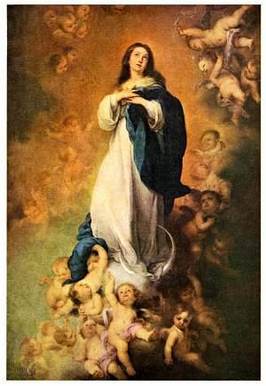 Readings
Reading I: Revelation 11: 19, 12: 1-6, 10
Reading II: Corinthians 15: 20-26
Gospel: Luke 1: 39-56
Gospel Reading:
Mary Visits Elizabeth
39 At that time Mary got ready and hurried to a town in the hill country of Judea, 40 where she entered Zechariah’s home and greeted Elizabeth. 41 When Elizabeth heard Mary’s greeting, the baby leaped in her womb, and Elizabeth was filled with the Holy Spirit. 42 In a loud voice she exclaimed: “Blessed are you among women, and blessed is the child you will bear! 43 But why am I so favored, that the mother of my Lord should come to me? 44 As soon as the sound of your greeting reached my ears, the baby in my womb leaped for joy. 45 Blessed is she who has believed that the Lord would fulfill his promises to her!”
Mary’s Song
46 And Mary said:
“My soul glorifies the Lord
47 and my spirit rejoices in God my Savior,
48 for he has been mindful of the humble state of his servant.
From now on all generations will call me blessed,
49 for the Mighty One has done great things for me--
holy is his name.
50 His mercy extends to those who fear him,
from generation to generation.
51 He has performed mighty deeds with his arm;
he has scattered those who are proud in their inmost thoughts.
52 He has brought down rulers from their thrones
but has lifted up the humble.
53 He has filled the hungry with good things
but has sent the rich away empty.
54 He has helped his servant Israel,
remembering to be merciful
55 to Abraham and his descendants forever,
just as he promised our ancestors.”
56 Mary stayed with Elizabeth for about three months and then returned home.
Reflection:
As we celebrate the Solemnity of our Blessed Mother's Assumption let us try to think of all the things God has wrought in our lives.
Today's Gospel reading lets us experience and share with Mary's joy as she proclaims the wonderful things God has done in her life and that of Israel's.
Mgkikita natin sa pagbubunyi ni Maria ang walang hanggang pagmamahal ng Panginoon s kanyang bayang hinirang. Ang pagmamahal na ito rin ang dahilan kung bakit ipinadala Niya ang kanyang bugtong na Anak upang tubusin ang sansinukob mula sa kinasasadlakan nitong kasalanan.
Labis ang pagmamahal ng Diyos sa tao. Bakit nga ba? Hindi ko rin alam ang dahilan nang labis niyang pagsinta sa atin. Ito ang hiwaga sa relasyon nang Diyos at tao. Tunay ngang napakamakapangyarihan ng magmamahal. Sapat na itong dahilan upang maranasan nang Anak ang mamatay upang matubos tayo.
Mga kapatid, sa bawat araw ay gunitain natin ang buhay na ipinagkaloob sa atin ng Maykapal. Pasalamatan natin siya sa lahat nang ito at sambahin sa tuwina. Lagi nating pakatandaan na ang kanyang pagmamahal para sa atin ay walang hanggan.
Contributor:
Fray Aimark Asor, OSA
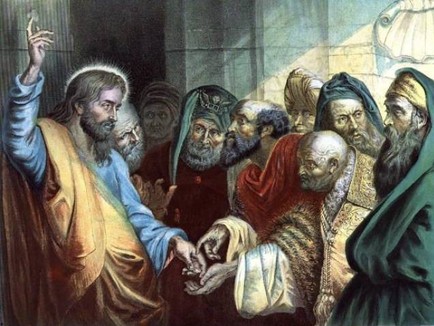
Sunday Readings
1st Reading: Kings 19:4-8
Psalm:
2nd Reading: Ephesians 4:30, 5:2
_Gospel Reading: John 6:41-51_______________________________________
The Jews murmured about Jesus because he said,
"I am the bread that came down from heaven,"
and they said,
"Is this not Jesus, the son of Joseph?
Do we not know his father and mother?
Then how can he say,
'I have come down from heaven?'"
Jesus answered and said to them,
"Stop murmuring among yourselves.
No one can come to me unless the Father who sent me draw him,
and I will raise him on the last day.
It is written in the prophets:
They shall all be taught by God.
Everyone who listens to my Father and learns from him comes to me.
Not that anyone has seen the Father
except the one who is from God;
he has seen the Father.
Amen, amen, I say to you,
whoever believes has eternal life.
I am the bread of life.
Your ancestors ate the manna in the desert, but they died;
this is the bread that comes down from heaven
so that one may eat it and not die.
I am the living bread that came down from heaven;
whoever eats this bread will live forever;
and the bread that I will give is my flesh for the life of the world."
Reflection:
"Murmuring and Disbelief"
In this Sunday, while we are still on the episode of the Bread of Life Discourse (Jn. 6:1-69), this particular part of the Gospel echoes to us the reaction of the Jews on Jesus’ manifestation of himself as the Bread of Life. The Jews reportedly murmured when Jesus manifested himself as Bread of Life. The content of their grumbling is but their faithlessness and distrustfulness to Jesus’ Words. Confidently, they dismissed Jesus’ claim by arguing that he is known as a son of his parents whom they know too well. This grumbling disbelief on their part however does not defeat Jesus’ claim; Jesus is still the Bread from heaven who gives life eternal. The Jews however are in the losing side however because their disbelief is but a perpetuation of their disbelief since the time of Moses. Surprisingly, many of the biblical experts identify the Jews’ murmuring in this context as a reminder of the days of Moses leading these disbelieving Israelites. That murmuring is reminiscent of their attitude towards God and to Moses’ decisions. Their discomforts during the forty years walking in the desert were dotted by series of murmurings and endless complaints against God. Now, as they encounter the Son of God himself – indeed God himself, the Jews has since blinded themselves with their complaints and murmurings. They failed to see in Jesus the promised Messiah and therefore, they failed to behold the one promised since the time of Moses. They keep on missing the point and instead, they settle on complaints and murmuring rather than stepping up towards faith. It is clear that Jesus pointed out to them that the Father will draw them in faith to Him; but it is so unfortunate that they cannot respond to the Father’s invitation because they simply cannot hear the Father’s invitation; what they can hear only is their own murmurings, their endless complains and consequently what they can hear is their disbelief. Who can step out from their own prison of disbelief if what they can hear is their selfish murmuring of faithlessness?
As a challenge, in considering one’s position in the most debated RH Bill today, it is so timely to consider stepping up from the murmur of disbelief and open one’s ear to the other side of the corner.
Contributor:
Fray Ric Anthony Reyes, OSA
|










 RSS Feed
RSS Feed